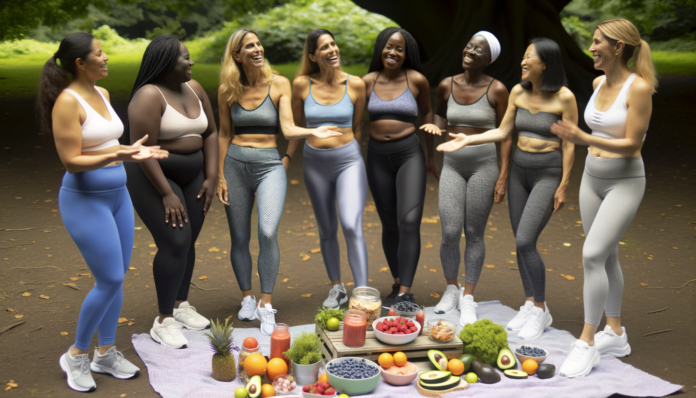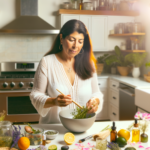
Introduction to Skin Health and Diet
The Connection Between Diet and Skin Health
Our skin, the body’s largest organ, is a reflection of our overall health, and it is profoundly influenced by what we eat. A diet rich in antioxidants, vitamins, and healthy fats can support skin health, while an unhealthy diet can exacerbate skin issues. Nutrients from foods help fortify the skin against environmental damage and support its repair and rejuvenation processes. For instance, omega-3 fatty acids found in fish are known for their anti-inflammatory properties, which are crucial for maintaining skin health.
Understanding the Skin’s Nutritional Needs
The skin requires a diverse range of nutrients to maintain its health and vitality. Essential fatty acids are necessary for keeping the skin hydrated and preventing dryness. Vitamins such as A, C, and E play a pivotal role in protecting the skin from oxidative stress and supporting collagen production, which is vital for skin strength and elasticity. Minerals like zinc and selenium are also important for skin repair and protection against environmental damage.
Challenges of Maintaining Skin Health in a Busy Lifestyle
Maintaining skin health can be challenging, especially in the context of a busy lifestyle. Time constraints may lead to reliance on processed foods and quick meals that lack the necessary nutrients for healthy skin. Additionally, stress and lack of sleep can negatively impact skin health, making it even more important to focus on a nutrient-rich diet that can help mitigate these effects.
Overview of Foods for Timeless Skin Health
To support timeless skin health, it’s essential to incorporate a variety of foods into your diet:
- Antioxidant-rich fruits and vegetables such as berries, oranges, and leafy greens help protect the skin from damage.
- Healthy fats from avocados, nuts, and seeds, as well as omega-3 rich fish like salmon, provide essential fatty acids for skin hydration and elasticity.
- Proteins from lean meats and legumes are necessary for skin repair and regeneration.
- Whole grains offer complex carbohydrates that deliver sustained energy and can help maintain a healthy glow.
- Hydration is also key, with water-rich foods like cucumbers and watermelon, alongside plenty of water and herbal teas, contributing to skin moisture.
By choosing the right foods and ensuring a balanced intake of these nutrients, you can support your skin’s health and maintain a youthful complexion, even in the midst of a hectic schedule.
Macronutrients and Skin Health
The Role of Proteins in Skin Repair and Regeneration
Proteins are the building blocks of life, playing a critical role in the repair and regeneration of skin tissues. Collagen and elastin, two types of proteins, are essential for maintaining the skin’s structure and elasticity. Consuming adequate amounts of high-quality protein from sources like fatty fish, lean meats, and legumes can support the body’s ability to repair damaged skin cells and produce new ones. This process is vital for healing wounds and reducing the appearance of fine lines and wrinkles, ensuring that the skin remains resilient and youthful.
Healthy Fats for Skin Elasticity and Hydration
Fats are often misunderstood in the context of a healthy diet, yet certain fats are indispensable for maintaining skin health. Omega-3 fatty acids, found abundantly in fish like salmon, mackerel, and sardines, are known for their anti-inflammatory properties and their role in maintaining skin hydration. These healthy fats contribute to the skin’s lipid barrier, helping to lock in moisture and protect against environmental stressors. Avocados and nuts like walnuts and almonds are also rich in monounsaturated and polyunsaturated fats, which support skin elasticity and help combat dryness, keeping the skin supple and well-hydrated.
Complex Carbohydrates for Long-Lasting Energy and Glow
Complex carbohydrates are an essential energy source that fuels all bodily functions, including those that keep the skin healthy and vibrant. Foods rich in complex carbs, such as whole grains, fruits, and vegetables, provide a steady release of energy, which is crucial for the regeneration of skin cells. These nutrient-dense foods are also high in dietary fiber, which can aid in the elimination of toxins and reduce inflammation. The result is a more even skin tone and a natural glow that reflects overall wellness. Additionally, complex carbohydrates are often packed with vitamins and minerals that further support skin health.
Vitamins and Minerals for a Youthful Complexion
Vitamin A: The Anti-Aging Ally
Vitamin A, a true anti-aging ally, is essential for the maintenance of healthy skin. It stimulates the production of new skin cells and helps to repair the existing ones, promoting a smooth, even complexion. Foods rich in vitamin A, such as carrots and sweet potatoes, contain beta-carotene, which the body converts into retinol, a key ingredient in many skincare products. Regular consumption of these vitamin A-packed foods can help combat dryness and ward off fine lines, making it a cornerstone for timeless skin health.
Vitamin C: The Brightening Booster
As a brightening booster, vitamin C is a powerhouse antioxidant that plays a pivotal role in collagen synthesis and skin repair. It helps to fend off the signs of aging by neutralizing free radicals and reducing the appearance of dark spots. Citrus fruits like oranges and lemons, as well as other vitamin C-rich foods such as strawberries and tomatoes, should be incorporated into your diet to maintain a radiant and youthful glow.
Vitamin E: The Protective Powerhouse
Vitamin E is renowned for its skin-protective properties. It acts as a natural barrier to UV radiation, preventing the oxidative stress that can lead to premature aging. Foods such as almonds, sunflower seeds, and spinach are excellent sources of vitamin E, which helps to keep the skin hydrated and less susceptible to damage. Including these foods in your diet can help maintain the skin’s natural moisture balance and protect against environmental stressors.
Zinc and Selenium: The Skin’s Shield
Zinc and selenium are minerals that serve as the skin’s shield, offering protection and aiding in the healing process. Zinc plays a crucial role in the structure of proteins and cell membranes, while selenium helps to preserve tissue elasticity and protect against cell damage from UV exposure. Foods like Brazil nuts, known for their high selenium content, and pumpkin seeds, rich in zinc, are vital for maintaining the integrity of the skin. Regularly consuming these minerals can help keep your skin robust and resilient against the signs of aging.
By incorporating these essential vitamins and minerals into your diet, you can support your skin’s health from the inside out. A balanced intake of these nutrients will not only enhance your skin’s appearance but also fortify it against the test of time, ensuring a youthful and vibrant complexion for years to come.
Superfoods for Skin Health
Antioxidant-Rich Berries for Damage Prevention
When it comes to maintaining youthful skin, antioxidants are your best friends. Berries, such as blueberries, strawberries, and raspberries, are packed with powerful antioxidants that help combat oxidative stress and inflammation associated with aging. These small but mighty fruits aid in neutralizing free radicals, which can lead to premature skin aging and damage. Incorporating a variety of berries into your diet can help preserve the skin’s collagen structure, promoting firmness and elasticity.
Leafy Greens: Detoxifiers and Nutrient Suppliers
Leafy greens like spinach, kale, and Swiss chard are not only nutrient-dense but also excellent detoxifiers. They are rich in vitamins A, C, and E, as well as antioxidants that protect the skin from environmental stressors. The high fiber content in these vegetables also aids in digestion, which is crucial for clear skin. Moreover, the chlorophyll in leafy greens may have a protective effect, potentially stimulating collagen production and reducing the appearance of fine lines and wrinkles.
Nuts and Seeds: The Snack for Skin Strength
Nuts and seeds are the perfect snack for those looking to enhance their skin health. Walnuts, for instance, are a great source of omega-3 fatty acids, which are essential for reducing inflammation in the skin. They also contain zinc, which is vital for skin repair and renewal. Similarly, sunflower seeds are abundant in vitamin E, an antioxidant that helps protect the skin from oxidative damage and supports skin barrier function. A handful of these can provide a significant boost to your skin’s health.
Omega-3 Packed Fish for Inflammation Reduction
Fatty fish like salmon, mackerel, and herring are renowned for their skin health benefits. They are rich in omega-3 fatty acids, which are necessary to keep the skin thick, supple, and moisturized. Omega-3s also play a role in reducing inflammation, which can manifest as redness and acne. Additionally, these types of fish are a source of high-quality protein, vitamin E, and zinc, all of which contribute to the strength and integrity of the skin. Including omega-3 packed fish in your diet can help protect against UV rays and promote overall skin health.
By choosing these superfoods, you can provide your skin with the nutrients it needs to remain healthy and resilient against the signs of aging. Remember, a balanced diet rich in vitamins, minerals, and antioxidants is key to achieving timeless skin health.
Hydration and Skin Health
The Importance of Water for Skin Vitality
Water is the foundation of healthy, vibrant skin. Adequate hydration is essential not only for the body’s overall function but also for maintaining the skin’s elasticity, suppleness, and radiance. When the skin is well-hydrated, it can appear plumper, minimizing the appearance of fine lines and wrinkles. Moreover, water helps to flush out toxins and can improve circulation, ensuring that skin cells are well-nourished with essential nutrients and oxygen. To maintain optimal skin health, it is recommended to drink at least eight 8-ounce glasses of water per day, and to include water-rich foods in your diet, such as cucumbers, watermelon, and oranges.
Herbal Teas: Skin Hydration with a Nutrient Boost
Herbal teas offer a hydrating alternative to water, with the added benefit of antioxidants and vitamins that can contribute to skin health. Teas such as chamomile, green tea, and rooibos are known for their anti-inflammatory properties, which can soothe irritated skin and reduce redness. Green tea, in particular, is rich in catechins, which can protect the skin from UV damage and improve its elasticity. Incorporating a variety of herbal teas into your daily routine can provide a comforting and beneficial ritual for both your body and your skin.
Limiting Dehydrating Beverages for Optimal Skin Moisture
While hydration is key to maintaining skin health, it is equally important to limit the intake of dehydrating beverages. Alcohol and caffeine, found in drinks such as coffee, tea, and soda, can lead to dehydration, which may result in dry, lackluster skin. These beverages can also disrupt sleep patterns, which is when the skin undergoes repair and rejuvenation. Moderation is crucial; aim to consume these drinks in limited quantities and balance them with plenty of water and hydrating foods to ensure your skin remains hydrated and healthy.
“`
Foods to Avoid for Timeless Skin
Sugar and Processed Foods: The Culprits of Aging
While sugar can sweeten your day, it’s not as kind to your skin. Consuming excessive amounts of sugar and processed foods can lead to glycation, a process where sugar molecules attach to proteins like collagen and elastin, impairing their function. This can result in a loss of skin elasticity and the formation of wrinkles. Processed foods, often high in sugar and lacking in essential nutrients, can exacerbate skin aging by promoting inflammation and oxidative stress. To maintain youthful skin, it’s advisable to minimize intake of sugary treats and processed snacks, opting instead for whole, nutrient-rich foods.
Dairy and High-Glycemic Foods: Potential Triggers for Skin Issues
Dairy products, particularly skim milk, have been linked to acne in some individuals. The exact mechanism isn’t fully understood, but hormones present in milk may play a role in triggering acne. High-glycemic foods, such as white bread and other refined carbohydrates, can cause spikes in blood sugar and insulin levels, potentially leading to increased sebum production and acne. For those prone to skin issues, reducing dairy consumption and replacing high-glycemic foods with low-glycemic alternatives like whole grains may help in maintaining clear skin.
Alcohol and Caffeine: Understanding Their Effects on Skin Health
Alcohol and caffeine are diuretics that can lead to dehydration, a condition that robs your skin of its plump, hydrated appearance. Alcohol, in particular, can also cause vasodilation, which may lead to a flushed appearance and exacerbate conditions like rosacea. Additionally, both alcohol and caffeine can disrupt your sleep, and lack of quality rest can negatively impact skin health, leading to dark circles and a dull complexion. To support skin health, it’s beneficial to consume these beverages in moderation and ensure you’re balancing them with plenty of water.
By being mindful of these dietary choices, you can help protect your skin from premature aging and maintain its timeless beauty. Remember, what you put on your plate is just as important as the products you apply to your skin.
Incorporating Skin-Healthy Foods into a Busy Lifestyle
Meal Planning and Prep for the Time-Strapped Individual
For those with a hectic schedule, finding time to incorporate skin-healthy foods into your diet can seem daunting. However, with a bit of planning and preparation, you can ensure that your skin receives the nourishment it needs. Start by dedicating a few hours each week to meal prep. Create a menu that includes fatty fish like salmon for omega-3 fatty acids, avocados for healthy fats, and a variety of colorful fruits and vegetables rich in antioxidants. Prepare these ingredients in bulk and store them in portion-sized containers for easy access throughout the week. This approach not only saves time but also reduces the temptation to reach for less healthy options.
Quick and Nutritious Skin-Healthy Recipes
Quick does not have to mean unhealthy. There are numerous skin-healthy recipes that can be prepared in under 30 minutes. For example, a smoothie with spinach, berries, and a scoop of protein powder makes for a powerful antioxidant-rich breakfast. For lunch, a quinoa salad with mixed greens, nuts, and a citrus vinaigrette offers a balanced meal packed with skin-protective nutrients. For dinner, grilled mackerel with a side of steamed broccoli and sweet potato is not only quick to prepare but also loaded with skin-beneficial vitamins and minerals.
Snacking for Skin Health: Smart Choices on the Go
Snacking can be a pitfall for many, but it also presents an opportunity to boost your skin health. Opt for snacks that are high in skin-supporting nutrients and easy to carry. Almonds, rich in vitamin E, make for a great snack that can help protect the skin against oxidative damage. Similarly, sunflower seeds are a portable source of vitamin E and selenium. Fresh fruits like oranges and bell peppers are not only hydrating but also provide a significant amount of vitamin C, essential for collagen production.
Staying Consistent with a Skin-Healthy Diet
Consistency is key when it comes to maintaining skin health through diet. To stay on track, keep your pantry stocked with skin-healthy staples like nuts, seeds, and whole grains. Incorporate skin-boosting foods into every meal, and remember to hydrate with water or herbal teas instead of sugary or dehydrating beverages. By making skin-healthy eating a habit, you’ll be more likely to see lasting benefits, such as improved skin elasticity, reduced inflammation, and a radiant complexion.
Remember, while a busy lifestyle can pose challenges, it doesn’t have to be a barrier to healthy skin. With strategic meal planning, quick and nutritious recipes, smart snacking, and consistent dietary choices, you can enjoy the benefits of a skin-healthy diet no matter how packed your schedule might be.








